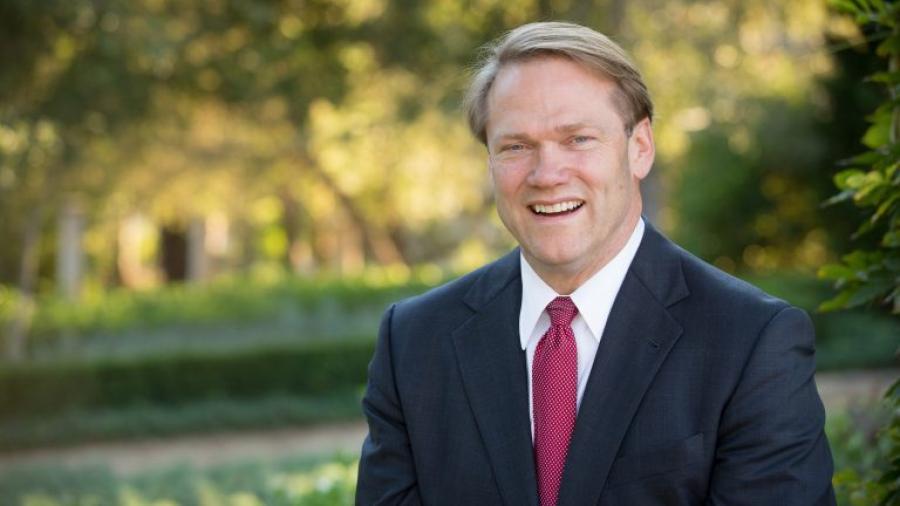Westmont Magazine Learning to Welcome Adversity in Life

Our chapel program focused on the theme Gratitude and Grit last spring, and I spent some time thinking about what it takes to develop grit, or the capacity to overcome obstacles and setbacks in life. How does God use obstacles to reform our character so we can serve his ultimate purposes?
During my time as president of Spring Arbor University, I met Jacob Atem, one of the lost boys of Sudan who got caught in a vicious civil war. He witnessed the murder of his parents and began running for his life at the age of 5 or 6. Joining a roving band of 5,000 boys, he ended up in a Kenyan refugee camp and eventually in Michigan. The U.S. government airlifted thousands of these boys and resettled them with families. Jacob told incredible stories of eluding war, watching other boys drown during river crossings or get eaten by crocodiles. Yet Jacob is one of the most joyful people I’ve ever met. He decided to find the greater purposes of God in his setbacks and reorient his life accordingly.
The first chapter of James says, “Consider it pure joy, whenever you face trials of many kinds, because you know that the testing of yo ur fait h produces perseverance. Perseverance must finish its work so that you may be mature and complete, not wanting or needing anything.” We should view trials as God’s way of shaping and redefining us.
Four words from t his passage leap out at me: trials, endurance, perfection (or coming to completion), and wanting nothing. Trials are put into our lives to prove who we really are, to reveal our true nature. What happens when we face a setback? Do we become manipulative and angry or remain reasonable and respond lovingly? We need to remember that others read us based on our response to adversity.
“Endurance” means bearing up under suffering. The passage assumes we will all suffer, which is certainly the testimony of my life. I’m grateful that we find in Christ the capacity and resources to face suffering.
In the Greek, “perfect” means complete and conveys the sense that each of us has a destiny. When we reach it and do everything we were created to do, we’re complete. “Wanting nothing” relates to setting aside desire. When we recognize our purpose, we no longer experience a craving, anxiety or drive to discover because we know our purpose.
During a time of adversity, I found the book “The Adversity Quotient” by Paul Stoltz. He sought to understand why some people become better through adversity and identified four key decisions that determine adversity’s effect on us.
First, we have to decide whether or not to strive to respond. Mark Twain said, “The two most important days of your life are the day you are born and the day you find out why.” Along with every follower of Christ, I assume we were put here for a purpose. When we discover that, life begins to take on great meaning—a richness and texture—that nothing else provides. Adversity can help us find the deeper purposes of God that prepare us for the life he intends.
Second, we choose whether to solve adversity individually or in community. One of my seminary professors at Princeton came from South Africa and used the theology of Dietrich Bonhoeffer to help us understand apartheid years before Nelson Mandela became president. He taught us that when you suffer—and when you find God in suffering—you develop the capacity to help others. Bonhoeffer helped us understand we can’t suffer alone—God brings people around us to help.
Third, do we seek to escape suffering or push through it to resolution? Augustine observed that everyone has a God-shaped vacuum. If we don’t fill it with God, we’ll fill it with everything other than God. This idea underpins Pascal’s treatment of diversion: if we don’t seek God, we’ll pursue all kinds of diversion that can ruin our life and any chance of making a contribution.
After arriving in the United States, Jacob hoped to become a doctor and return one day to Africa and get married. But he didn’t get into medical school, so he earned a graduate degree in public health at the University of Florida instead. He finally accumulated the wealth required in his culture—50 cows—to pay a dowry and marry. Now he seeks to start a health-related organization in South Sudan. I know he’ll succeed despite a lack of resources because he has never let a setback keep him from fulfilling God’s purposes.
Everytime I’ve faced a setback and persevered, I’ve learned something new. Our life on Earth is about developing the character and capacity to live out God’s calling, and adversity can help us achieve that ultimate goal.
By President Gayle D. Beebe, Ph.D.